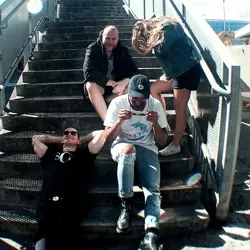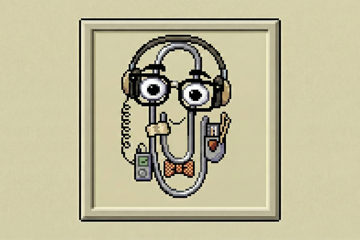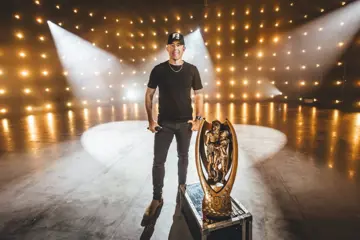 Press Club
Press ClubIt's almost like a riddle: Melbourne quartet Press Club recorded their debut LP - the impressive Late Teens, an album full of both punk fury and a persistent melancholy - as live as possible, capturing what they thought was their strongest quality: their dynamic as a live band. The only thing was, when they recorded the album, they'd never actually played under the Press Club banner outside of their rehearsal spaces. "We started with the album," says singer Natalie Foster. "We recorded it before we started playing live."
Press Club were born, essentially, from the pieces of the now-defunct Tully On Tully in the Brunswick East house of bassist Iain MacRae; the house turned into a songwriting 'sweatshop', the band writing over 50 songs over a four-month period. "We got together in a room and jammed, and figured out what was gonna come out," says Foster. "And, it turns out, it was punk music."
Once they'd cut the album, the band made up for lost time, gig-wise; playing a constant stream of word-of-mouth-cultivating shows in Melbourne. They recently took their show on the road: spending eight weeks touring Australia with The Smith Street Band and Bec Sandridge.
"I'd say that touring with The Smith Street Band was one of the best experiences of my life," Foster says. "It was awesome. It was really exciting to go to so many of those places you wouldn't usually go and engage with a different audience that wouldn't get to see you otherwise. It was so great to get to play in Darwin and Alice Springs, because, when are we going to get an opportunity to go there as a band? It's really expensive, and really hard, to tour out there. We loved it. And we got to play a lot of underage shows, which was really cool. Because kids go hard."
Don't miss a beat with our FREE daily newsletter
The tour also found Foster playing her first-ever 'hometown' show with Press Club, back in Ballarat. "It was pretty fun. I was pretty nostalgic. There were some of the same bartenders that were there when I was 19, 20," Foster laughs. Growing up, in the 'Rat, she studied music, playing piano and cello, writing folkie songs. When she moved to Melbourne, it wasn't music that brought her here; instead, she studied Advanced Maths, Physics and Chemistry at Melbourne Uni, making her a rarity in the rock'n'roll world. "No Arts degree! Absolutely not!" Foster laughs.
Foster would play shows around Melbourne - she vividly remembers her first-ever show, at the Rainbow Hotel - and, when the band first spoke about playing together as Press Club, it was as her backing. But, things soon changed; the punk energy between them palpable from the beginning. "It was literally as soon as we got in that room for the first time, to see if we could write some tunes. We immediately all just went, 'Ah, shit, this is going to be good!'" Foster recounts.
The volume, and vehemence, with which the budding band played and sang reflected their lives. "I was getting kicked out of the house I'd been living in for four years, I had to move out," Foster recounts. "It was getting demolished for apartments. It's not an uncommon story, by any means. But having had that, and having seen the guys go through that, I think we had this sense of frustration about our lives, our living arrangements. The artwork reflects that."
The artwork for their singles and album shows images of inner-north gentrification: Foster's half-demolished old house, the rundown weatherboard shack in Brunswick famous (and flipped as) 'the Beyonce house', an empty block behind a pizza shop covered in ivy, surely about to be sold for a mint. The latter image is on the cover of Late Teens, a pic just taken on Foster's phone.
Against this recurring visual theme (echoed by the title of single Suburbia), the name of the album stands in contrast. But as to why Press Club chose the title Late Teens for their debut LP, Foster offers a shrug. "That's a good question that we don't have an answer to," she says. "I think a lot of other people have been getting more from it than we have, have been interpreting it in these very deep ways. To us, it just felt right. And, sometimes, you've just gotta go with what feels right."















